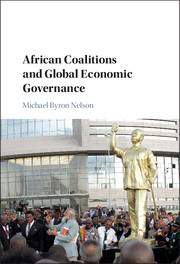Book contents
- Frontmatter
- Contents
- List of Figures
- List of Tables
- Acknowledgments
- List of Abbreviations
- 1 Introduction
- PART I THEORY AND BACKGROUND
- PART II CASES
- 5 Global Food Safety Governance and Africa
- 6 Global IP Governance and African Coalitions
- 7 Africa and the Governance of Agricultural Trade
- 8 Conclusion
- Bibliography
- Index
7 - Africa and the Governance of Agricultural Trade
from PART II - CASES
Published online by Cambridge University Press: 05 September 2016
- Frontmatter
- Contents
- List of Figures
- List of Tables
- Acknowledgments
- List of Abbreviations
- 1 Introduction
- PART I THEORY AND BACKGROUND
- PART II CASES
- 5 Global Food Safety Governance and Africa
- 6 Global IP Governance and African Coalitions
- 7 Africa and the Governance of Agricultural Trade
- 8 Conclusion
- Bibliography
- Index
Summary
It should surprise no one that Africans care about agricultural trade. While this is changing, most Africans still live in rural areas, and agricultural activities employ more than half the African labor force. During the late 1990s and early 2000s, there was heightened awareness to the challenges that African producers face when competing on uneven world markets. This was the theme of the 2005 Live 8 concerns, where Bob Geldorf and Bono (both receiving nominations for the Nobel Peace Prize) linked the problem of international trade with poverty reduction in Africa. Global agricultural trade governance can cover a wide range of issues, from trade in genetically modified (GM) foods to food aid and coffee cartels. This chapter focuses primarily on the issues covered in World Trade Organization (WTO) negotiations. Those negotiations focus on three “pillars.” The first is “market access,” which usually translates into reduction in tariffs but also includes discussions about other regulatory measures that may act as nontariff barriers. The second pillar involves “export support.” The stated negotiating goal is to reduce “with a view to phasing out, all forms of export subsidies.” The third and final pillar involves “trade-distorting domestic support.” This includes income-stabilization plans for farmers that may incentivize overproduction. While this negotiation structure was outside Africa's control, this does not mean that African states cannot influence outcomes within the structure or lend weight to its various interpretations. Indeed, they can benefit from the greater amount of attention they devote to these issues as well as the credibility of their concerns regarding global governance outcomes.
In this chapter I argue that two features of the agricultural trade governance institutional system (IS) matter: its thickness and its hierarchical nature. The WTO is at the pinnacle of that hierarchy, making it a focal point for coordination by African and other states. It thus matters that the WTO tends to create rules by consensus. These combined characteristics help us to understand why coalition formation has been so popular and successful in this issue area. Here I first provide the greater institutional context for African states and the coalitions they are forming, considering significant changes in the agricultural trade IS over time. The next section outlines the issues of global agricultural trade governance and the interests of African states in those issues.
- Type
- Chapter
- Information
- African Coalitions and Global Economic Governance , pp. 206 - 236Publisher: Cambridge University PressPrint publication year: 2016

